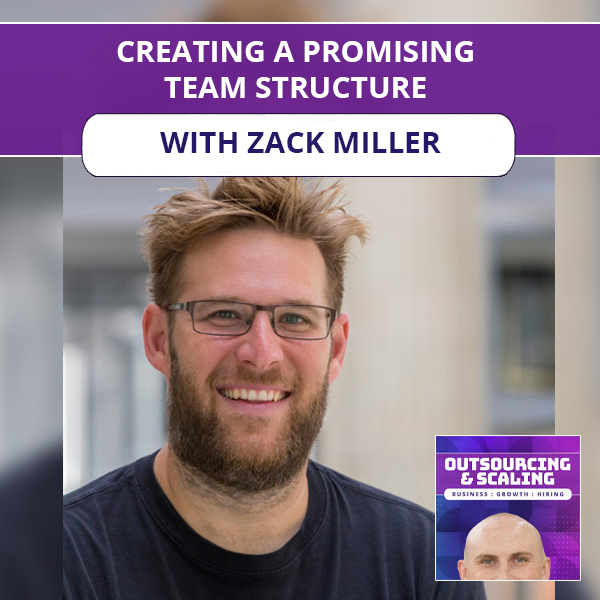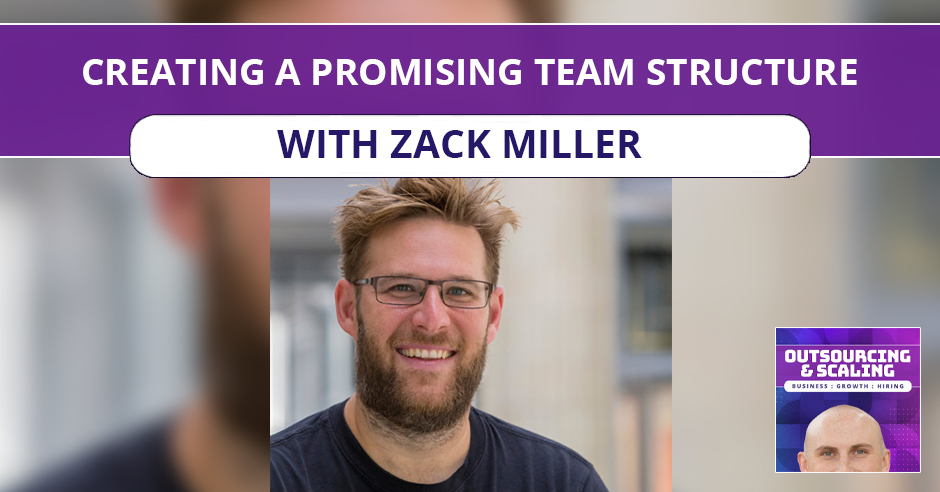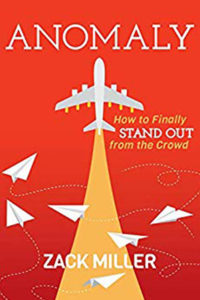


Developing a team comprised of people you favor and creating a team structure involves a lot of factors. Today, Nathan Hirsch interviews journalist-turned-entrepreneur Zack Miller about the importance of communication, relationship building, hiring the right contractors, and giving recognition to the right people. Zack has pioneered brand strategies way before they become household names and authored Anomaly: How to Finally Stand Out From the Crowd where he shows us how to make our brands stand out by creating a team structure that brings in promising results.
—
Listen to the podcast here:
[smart_track_player url=”https://www.podetize.com/statsapi/www.podetize.com/wp-content/uploads/fileuploads/11-5b145ef137b51b3d1af0633e9305c43d/02/2020/9b33ebb4ebc064462000e6768c93e531.mp3″ title=”Creating A Promising Team Structure With Zack Miller ” artist=”Nathan Hirsch” image=”https://freeup.net/wp-content/uploads/2019/04/OAS.png” ]
Download the audio file here.
My guest is Zack Miller. Zack, how are you doing?
Wonderful. How are you?
I am great. I’m pumped to have you. For those of you that don’t know, Zack Miller is a journalist turned entrepreneur who pioneers brand strategies way before they become household names. He has authored Anomaly: How to Finally Stand Out From the Crowd. He thinks your icebreaker questions should not be, “What do you do?” Rather, “What are you watching on Netflix?” Zack, we’re going to talk about all of that. First, let’s take a gigantic step back. What were you like growing up as a kid? Were you a straight-A student? Were you a rebel? Did you always know you wanted to be an entrepreneur?
I was not a straight-A student. I was definitely a rebel. I’ve probably lived that my entire life. I did what I wanted. I used to have a ‘78 Caprice Classic, which is like an old beater cop car. I painted it with flames on the side of it and drove around. It’s one worst car. I didn’t like to follow the rules and I felt that the best way to live was that way. I still follow some rules and still work myself up some corporate ladder. Growing up, I did what I wanted. I played sports a lot and felt that I could do whatever I wanted throughout time. Here I am still doing that.
When I think of journalists and entrepreneurs, I almost think of two totally different things that are not compatible in any way. Walk us through this. How did you first get into journalism and how did that lead you down the entrepreneurial path?
I graduated from high school in 2002. I originally wanted to design roller coasters. I took one math class, one engineering class, and I was like, “This is too much. I can’t do this. There’s no way I’m going to pass this.” At the time, your first 100 level class or 200 level class, they end up making you take a bunch of crap that you don’t want to do. I ended up taking a public speaking class and I was like, “This is cool. I’m pretty good at this. I get in front of a bunch of people.” I’ve already been a head coach for a swimming team talking in front of people. Put a camera in front of me or public speaking in front of me and I’ll be fine.

At the same time, ESPN was doing their version of American Idol where you could become a sports anchor. I was like, “This is interesting.” I tried out for that. I didn’t make it but I was like, “Maybe I can be a sports journalist.” I went to West Virginia University to get a journalism degree. There’s not a lot of actual journalism schools. There are less than 40 in the country. There was a bunch of communications school but not a lot of journalism schools. I did that for three years and realized it was not what I wanted to do. The way I like to describe it is to imagine meeting someone on the worst day of their life every single day.
It’s an emotional toll on them. It’s an emotional toll on you, but what it does teach you is deadlines galore. It could be 3:00, something terrible happens and you have to report that story on the news for a 4:00 or 5:00 story. It makes you be quick on your feet, which is what I also think entrepreneurship has. I always want to tell people stories and help people out in that way. When I realized I didn’t want to do it anymore, I found a quick other career. While doing that, I jumped in doing my own thing.
Walk us through your first entrepreneurial endeavor. How did that go? I always find that first year interesting. I feel like that’s a make or break year. People are like, “I’m going to start a business. I’m going to have more freedom.” That first year, you’re working 60 hours a week. You’re failing over and over again. What did that look like for you?
All of that is true, but the most important stuff is I was creating a ton of relationships that helped me with the other stuff as well. The first year was good. I was putting on a lot of entrepreneurial events where we would put a bunch of people together and teach people how to run a business, market their business, etc. When we got into year three, we decided to do something super big. We had run 2 or 3 of these smaller events and a bunch of smaller meetups. The smaller meetups were probably 40 to 50 people once a month, and the bigger events were probably 200-ish once or twice a year. There would be sponsors pay to get in for those to get pricing, then some other stuff included in there. In year 2 or 3, we decided to go big, but where the mistake in that was this conference called Drop Anchor.
We decided to do a different event that wasn’t paired with a group of people that we had already been working with. We had done some surveys and said, “What type of event would you want?” Some of them were saying, “We want you to do a solo focus marketing conference.” We started doing that, but what we didn’t realize is that the target customer wasn’t looking for that and then wasn’t looking for it in the time frame, that type of day, and the monetary value of it too. They were paying $200 before where in this case, we were trying to charge them $500 or $600. To break even, we needed 600 tickets sold and we sold like 30. I always remember this as I give this talk. I forgot how bad it was until the accountant said, “This is how much money you lost. This is how much this stuff.” We canceled this event. We had to pay for a lot of the speakers and for a lot of the other stuff that we had done. The lesson learned is there’s a progression to go with it. If you have been building a specific customer base, make sure you’re developing that next level for them, not going back to ground zero. That’s where we messed up. The marketing behind that was terrible.
Who was your first hire in that business and how did that part go?
It’s probably always been the same business. There was a cofounder at one point and then he fell off when the event went under. He was like, “I can’t do this anymore.” He was doing the complete opposite of what I was doing. That was not necessarily detrimental but it was definitely hard to be like, “Who’s going to do this now?” There was a year off where I was like, “I don’t know what I’m going to do.” I was doing some consulting on the side and the business throughout that. I remember I got this message from this kid and he was like, “I’m looking for an internship.” I was like, “We’ll see where this internship goes. Let’s do three more months.” It went well and decided to go back to our own ways. We started developing some courses online and started getting some traction on that off of the old customers that we had been building forever. That was the next evolution. That was from an internship that turned into a hire and then it grew from there.
What does your team structure look like? Is it you and a partner? Do you have VAs as freelancers? Do you have internal contractors in your office? How does that look like?
Several months ago, I had as much as seven full and part-time people. We had a huge office, 5,000 square feet. It was quasi co-working where we had some other people working with us. I decided to get rid of all of that. We completely got rid of the entire staff. I read a book called, Profit First and it kept telling me like make sure the people that you have here are going to help you grow for the future. They were good for that, but not for the next part. It’s more on an ad hoc basis now. When I need something, I hire that person to do it. A staff of one plus the freelancers when necessary.
How do you know if the current people that you’re using are going to be the best people going forward to get you to that next level? That’s where a lot of people struggle. They get complacent. They find Bob, Joe or Sally who are good and solid, but they’re not the minds that get that business to the next level in the future.
There’s a ton of data that you can look at. There are a ton of KPIs and all that stuff. At the end of the day, it’s trusting your gut. To me, just know if I am asking other people about this person constantly, if I’m being told things about this person constantly, it doesn’t matter how much training, reinforcement, and conversations you have with those people. If you’re still feeling in your gut that something’s wrong, you probably need to do something about it. We were on a growth trajectory and I was talking about this with my accountant. He was like, “You’re doing everything right. You decided you didn’t want to do it anymore. You trust your gut. You realize that it wasn’t the path that you were moving forward with and it’s what you have to do.” Your gut is like you’re looking in the mirror. Trust the person that you look at. People can look at numbers too much and not trust their gut enough. At the end of the day, that’s what I do. I wish I would do these things earlier than later. Oftentimes, we sit on it for too long.

I talk about this a lot in my Facebook group, Outsourcing Masters. A lot of people, when they go to that on-call route, they’re like, “I’m going to use these people as needed,” a project here, project there, whatever it is. They sometimes struggle because they’re in the mentality that, “I have everyone available to me 24/7 whenever I need it.” We know that’s not how the real world works. Freelancers usually don’t like that relationship. They need a heads up. There is a certain timeline on your end, for your clients, for you personally, whatever it is. How do you balance that? How do you have people that are not dedicated to you 40 hours a week and you’re going 2 or 4 projects and still maintain good long-term relationships?
When I wrote my book, that was the hardest thing. It’s like waiting on people. Physically writing the book took me five weeks in February of 2018. It was six months of other people touching it, waiting for artwork, edits, publisher, responses, this and that. It’s out of your control. It’s like meditation or working out. Everything has nothing to do with the business. It’s just controlling what you can. I was trying to put deadlines in place and communicate with people. A lot of the stuff is, do you want the best thing possible, especially for something like a book or do you want it to be rushed? After the first two months, it’s like, “This is going to take a while,” because there are a lot of moving parts.
You have certain people that you want to read it before it gets to the next level. Let’s say I gave you the book as someone influential and I was like, “I want you to read this and give me your feedback on it.” You’re a busy person. I can’t expect you to get it done in a day. I have to give you 45 to 60 days of a grace period in there to be like, “Can you get this done?” I have to give my actual editor 45 days to get it done because I’m paying them and I want them to do a kick-butt job. There are the publishers. There are all these moving parts. At the end of the day, it’s control what you can and try to put deadlines in place, but realize if you want something done right, it takes time. You can’t get overwhelmed by waiting for something to get as close to perfect as possible.
What other communication methods are you using? How are you communicating with all these remote people?
I typically ask the person what’s the best way to communicate with them first. Is it via text, Facebook Messenger or email? Is it calling them on the phone? Whatever it might be. It’s not your standards, Slack or anything like that. It’s usually a direct messaging platform that is not a communication tool that’s been built out. It’s literally a text, a phone call, an email, etc.
What other hiring tips do you have for the audience? What else have you learned in your years of doing this and switching up how you’ve been hiring over time?
Look through the relationships that you have first to see if there’s someone in there that you have created a great relationship with. My editor, I happened to be on his podcast before. I knew what he did. We never talked about business necessarily. When got this opportunity to publish a book, I was like, “I need an editor, who could I have?” I went back through my databases and said, “Here’s Chris Jones. He’s an editor. I’ve never necessarily worked with him, but I liked what he did. Let’s give him a call and see what can happen.” Honestly, I didn’t even go through multiple people with him. I said, “I liked what I heard after our conversation. Let’s do this.”
I respected him enough that I said, “I don’t need to talk to anyone else. Your price is what I budgeted for and I didn’t even know what to budget for. I’ve done other things with you in the past. I feel like you’re going to do a good job.” Trust the gut. If the gut gets in the way, then we have a different conversation. I felt like the things that he had said and the conversations that we had over the years were far and enough going to show that everything’s going to be fine. That’s how I live everything. We meet people in every walks of life. Focus on the low hanging fruit. That’s the relationship that you have. You don’t need to be searching for other stuff. Make sure the people who have busted their tails to get into your database are getting the shot that they deserve because you’ve created that relationship with them already.
We have all these different businesses like Amazon sellers, marketing agencies, business coaches and consultants. How does someone stand out from the crowd with all these different social media? People are constantly being blasted by content. You see a lot of people copying other people. What is your advice if someone’s like, “How do I stand out more to my target audience?”
The first thing is I don’t care what my competition is doing. I wrote a marketing book. There are millions of marketing books out there. I do things that other people do. I’m not worried about what other people are doing. Number two is to realize that you have to literally do something completely different or else you’ll never be seen. How many ads do you think that you see a day? The number that I found in 2013 is 5,000 ads each and every day. It’s you versus 4,999 others every single day. At the end of the week, it’s 35,000 people and brands that you’re competing against.
If you play the copycat method, you’re literally camouflaged. You have to look at stuff as, “How can I be a pioneer? How can I do things that are different?” Your business FreeUp is not spelled in a conventional way. That third E makes people double-take. That’s what you’re trying to do. You have to get the double-take. Several years ago, the FCC had changed a rule that allowed audio on radio and TV commercials to be at consistent decibel. Before, it could be super high or super low to get someone’s attention. The reason was they’re trying to get someone’s attention.
It like The Rock poster that I have with crazy hair. I would go to a Chamber of Commerce event with jeans and t-shirt and everyone else would be in suits. People are like, “Who is this donkey?” I’m trying to stand out. I have to get your attention. If I do what everyone else does, you will go back afterward and be like, “I don’t remember anyone.” I want to be that person that people remember. You have to look at stuff and say, “I can’t just copy this strategy that everyone else is doing because it will blend in with everyone else.”

You’re talking to me about your mentality on podcasts. I think we have the same mentality, but I’d love for you to share that with the audience as well.
In podcast and business too, a lot of people talk about, “What are your numbers? What are your downloads? What are your views? How many people are following you?” That’s great and dandy. At the end of the day, it’s about creating relationships with the hosts, with your guests, and with the people that are listening. At the end of the day, those networks are your champions. Those champions will likely bat for you far more than getting on a bunch of podcasts. If your strategy is let’s get on 1,000 podcasts, then you do and you create no relationship with that person, it was worthless, in my opinion. You have to focus and spend time on that relationship. Get on someone’s podcast. Afterward, send them a thank you card and keep in contact with them. Engage with them on their social networks, connect them with other people that you can that you see as a good fit. Don’t just get on the podcast and be like, “Thanks, give me your views.” Create real relationships like friendship with people. If you do that, they’ll bat for you more and they will help you the way that you want rather than getting them 5,000 downloads one week out of the year. That is not worth it.
Zack, this has been great. Where can people find out more about you and what are you most excited about?
You can find me at ZackMillerSays.com. I believe that men wearing jean jackets are the future. Men are going to start wearing more jean jackets than they have in the past and they’re going to rock them. I started this trend roughly several months ago. On stage, instead of wearing suits, they will be wearing jean jackets as their jackets. Until everyone else is copying it, something else will come in, snag it and do something different.
Have a great rest of the day. It’s been awesome.
You too. I appreciate it.
Important Links:
- Zack Miller
- Anomaly: How to Finally Stand Out From the Crowd
- Profit First
- Outsourcing Masters Facebook group
- ZackMillerSays.com
About Zack Miller
 Zack Miller is a journalist turned entrepreneur who pioneers brand strategies waaay before they become household names.
Zack Miller is a journalist turned entrepreneur who pioneers brand strategies waaay before they become household names.
He authored, Anomaly: How to Finally Stand Out From the Crowd and thinks your icebreaker question should not be “Hey, what do you do?”, rather, “What are you watching on Netflix?”
